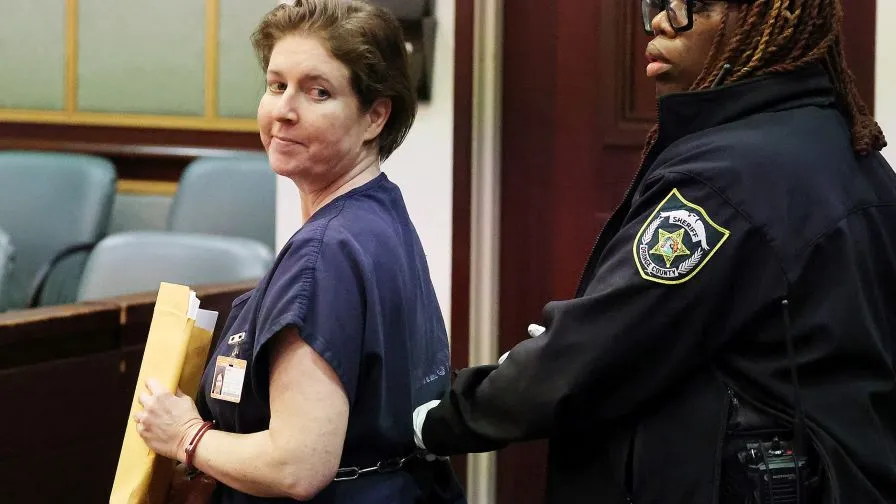Sarah Boone, a Florida woman, was sentenced to life in prison on December 2, 2024, for the second-degree murder of her boyfriend, Jorge Torres Jr., in a crime that gained national attention. The grim case began in February 2020, when Boone claimed that a playful game of hide-and-seek spiraled into tragedy. She allegedly zipped Torres into a suitcase at their home in Winter Park, Florida, and left him trapped for hours, leading to his death by asphyxiation.
The circumstances of the case were chilling. Boone initially described the incident as an unintentional act fueled by alcohol, insisting that she had no intention of harming Torres. She maintained that they were drinking together and decided to play hide-and-seek. Torres willingly climbed into the suitcase, and Boone zipped it closed.
However, video evidence retrieved from Boone’s phone painted a starkly different picture. In the recordings, Torres can be heard pleading for help, saying he could not breathe, while Boone mocked him, dismissing his cries and laughing. Prosecutors argued that these videos demonstrated her clear awareness of the situation and her intent to cause harm.

Boone claimed she fell asleep while Torres was still trapped in the suitcase and only discovered him unresponsive the next morning. She called emergency services, reporting his death, and initially told authorities that Torres’ injuries were from unrelated incidents, such as a fall from a bicycle.
However, her explanations unraveled under police interrogation, especially after investigators confronted her with the video evidence. Boone attempted to justify her actions by claiming she thought Torres could unzip the suitcase from the inside, a statement prosecutors vehemently disputed based on the lack of any signs that Torres had tried to escape.
The legal proceedings were fraught with delays and complications. Boone cycled through nine lawyers before her trial began, many withdrawing due to conflicts or irreconcilable differences with their client. At one point, Boone forfeited her right to court-appointed counsel and was briefly forced to represent herself.
In a striking display of her desperation, she created a handwritten advertisement seeking an attorney, which included dramatic appeals and promises of national media attention. Boone eventually secured representation, but her behavior in court and contentious relationship with her legal team became defining aspects of her trial.
During the trial, Boone’s defense argued that she suffered from battered woman syndrome, claiming that her relationship with Torres was marked by mutual abuse and that her actions were not premeditated. Despite this defense, the jury found her guilty of second-degree murder after less than two hours of deliberation. The evidence against her, particularly the damning videos, made it challenging for the defense to counter the prosecution’s portrayal of Boone as someone who acted with malicious intent.
Boone’s sentencing hearing was equally dramatic. In her final statement, she addressed Torres’ family, ostensibly to apologize, but her words came across as combative and self-serving. Her remarks drew sharp criticism from legal professionals and observers, with some describing her speech as a textbook example of how to alienate a judge and jury. The court handed down the maximum sentence of life in prison, reflecting the severity of her crime and the lack of genuine remorse displayed during the proceedings.
The case drew significant public attention not only because of the bizarre nature of the crime but also due to the broader issues it highlighted, such as domestic violence, substance abuse, and the challenges faced by the legal system in managing defendants with difficult behaviors.
Boone’s rejection of a plea deal offering a 15-year sentence for manslaughter further underscored her combative approach to the legal process. Her choice to go to trial, despite overwhelming evidence, and her confrontational demeanor during proceedings likely contributed to the harshness of her sentence.

Beyond the courtroom, the case has sparked conversations about the dynamics of abusive relationships and the extent to which such factors should influence sentencing. While Boone’s defense sought to portray her as a victim of circumstance, the prosecution successfully argued that her actions demonstrated a reckless disregard for Torres’ life. The jury’s swift verdict reflected their agreement with this interpretation of the evidence.
In the aftermath of her sentencing, Sarah Boone’s case serves as a stark reminder of the devastating consequences of untreated personal and relational issues. The combination of alcohol abuse, domestic discord, and poor decision-making led to a tragic loss of life and a permanent fracture in the lives of those involved. For Torres’ family, the verdict provided a measure of closure, though it could never undo the harm caused.
For Boone, the life sentence marked the culmination of a series of poor choices and a refusal to accept responsibility for her actions. This case will likely be remembered not only for its shocking details but also for its broader implications regarding accountability and justice.



